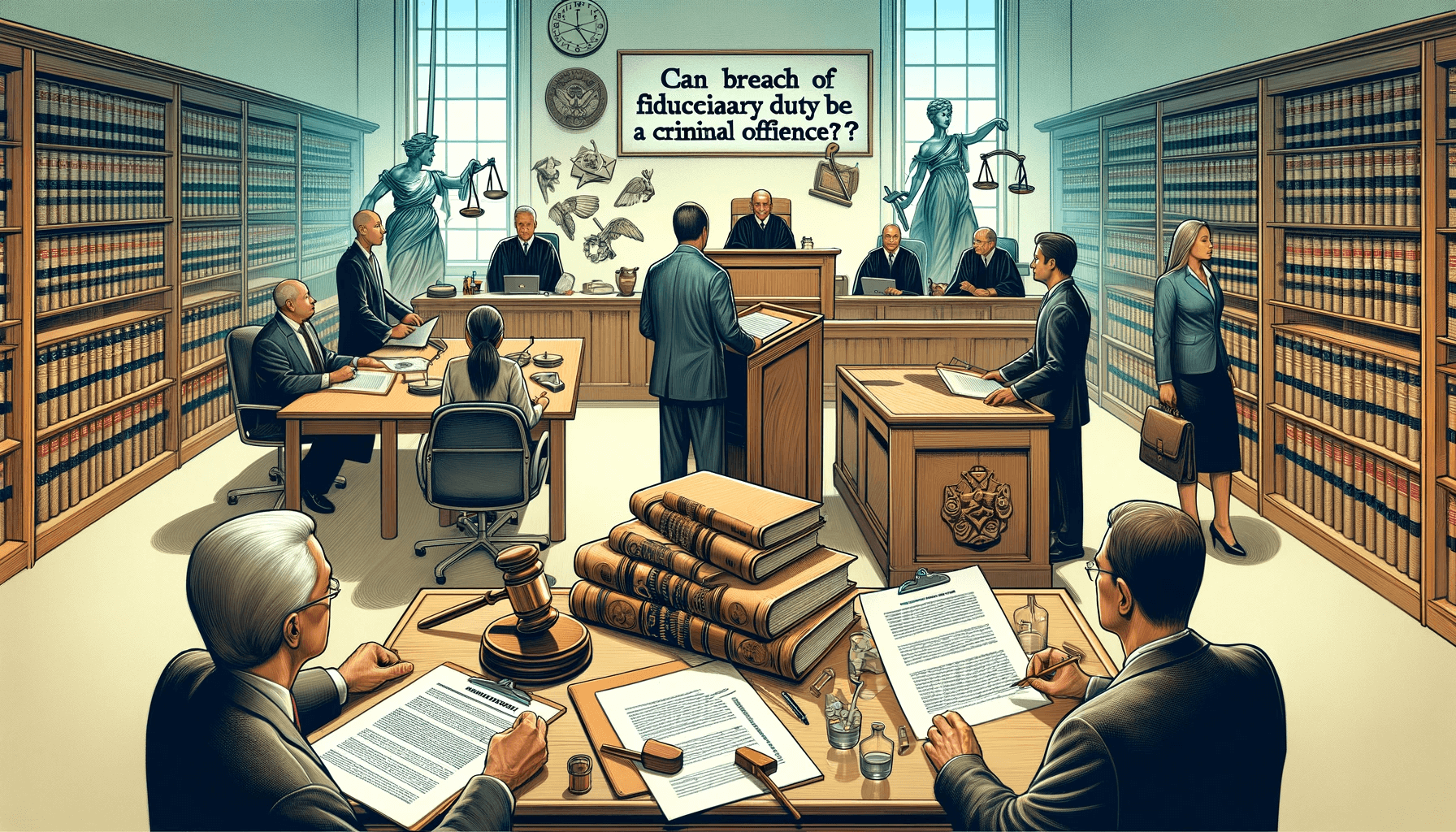Hello there! Delving into the intricacies of legal terms can often be a perplexing journey. Today, we’re going to explore a particularly nuanced topic: “Can breach of fiduciary duty be a criminal offense?” As a complex legal concept, it’s essential to break down what fiduciary duty entails and how its breach could cross over into the realm of criminality. So, let’s embark on this detailed exploration.
Understanding Fiduciary Duty: The Foundation
Before we dive into the criminal aspects, let’s first understand what fiduciary duty is.
Definition and Significance:
- Fiduciary Duty at Its Core: This is a legal obligation of one party (the fiduciary) to act in the best interest of another (the beneficiary or principal). This relationship is based on trust, confidence, and a special legal and ethical responsibility.
- Common Fiduciary Relationships: These include relationships between trustees and beneficiaries, attorneys and clients, corporate directors and shareholders, and guardians and wards.
Breach of Fiduciary Duty: From Civil to Criminal
Typically, a breach of fiduciary duty is seen as a civil matter. However, under certain circumstances, it can escalate into a criminal offense.
Civil vs. Criminal Implications:
- Civil Liability: In most cases, breaching this duty leads to civil lawsuits, where the aggrieved party seeks compensation for their losses.
- Criminal Charges: In some instances, particularly when the breach involves fraud, embezzlement, or other illegal activities, it can become a criminal matter.
The Thin Line: When Does a Breach Become Criminal?
Identifying when a breach of fiduciary duty crosses into criminality is critical.
- Fraudulent Intent: If the fiduciary intentionally deceives or defrauds the beneficiary, it can constitute criminal fraud.
- Misappropriation of Funds: Embezzlement or illegal misappropriation of funds entrusted to the fiduciary can lead to criminal charges.
- Severe Negligence or Recklessness: In some jurisdictions, gross negligence or reckless disregard in fiduciary responsibilities may be criminal.
Legal Consequences of Criminal Breaches
The consequences of a breach turning criminal are severe.
- Penalties and Sentencing: This can include imprisonment, hefty fines, and restitution payments.
- Record and Reputation Damage: A criminal conviction can lead to a permanent criminal record, severely damaging the individual’s professional and personal reputation.
Case Studies and Legal Precedents
Exploring case studies where breaches of fiduciary duty led to criminal charges provides valuable insights.
- Historical Cases: Reviewing landmark cases helps in understanding how the legal system has handled such breaches.
- Legal Precedents: These cases set precedents that influence how future breaches are interpreted and prosecuted.
Legal Defenses in Breach of Fiduciary Duty Cases
Defending against criminal charges in breach of fiduciary duty cases requires a robust legal strategy.
- Lack of Criminal Intent: Demonstrating the absence of fraudulent intent is a common defense.
- Fulfillment of Duties: Proving that the fiduciary acted within the scope of their duties and in good faith.
- Constitutional Defenses: In some cases, constitutional defenses such as the right to a fair trial and due process are applicable.
The Role of Legal Counsel
Navigating allegations of criminal breaches of fiduciary duty demands expert legal guidance.
- Expert Representation: A skilled attorney can provide the necessary legal representation and advice to navigate these complex cases.
- Strategic Legal Planning: Crafting a legal defense that addresses the specific nuances of the case is crucial.
Preventative Measures and Best Practices
Understanding how to prevent breaches is as important as knowing how to address them.
- Ethical Standards and Compliance: Adhering to high ethical standards and regulatory compliance can help prevent breaches.
- Regular Audits and Transparency: Implementing financial audits and maintaining transparency in operations.
Conclusion: Navigating the Complexities
In conclusion, while breach of fiduciary duty typically falls under civil law, certain actions can escalate it to a criminal offense. Understanding the fine line between civil liability and criminal culpability is essential for fiduciaries, beneficiaries, and legal professionals alike.









Leave a Reply